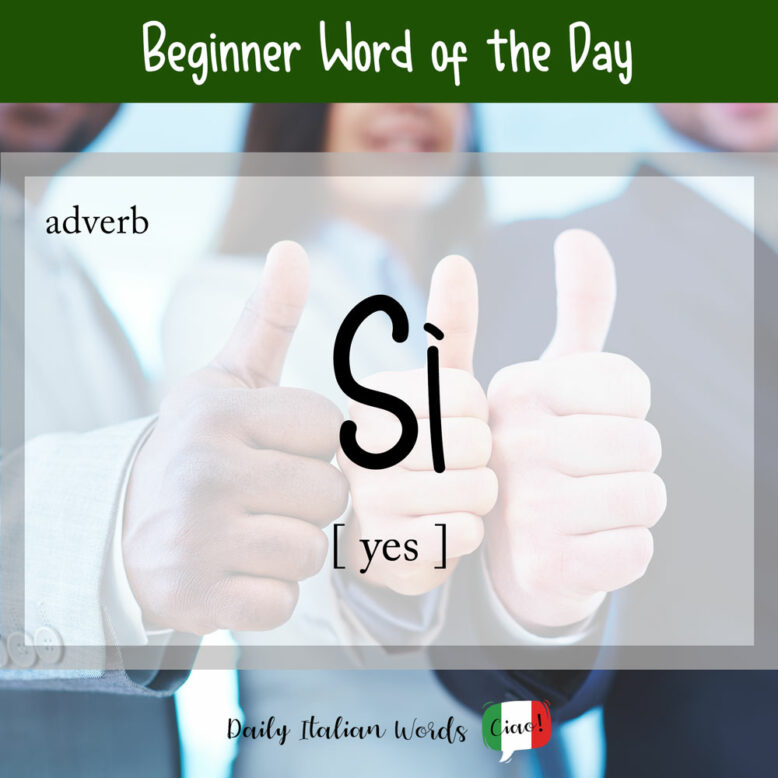To say yes in Italian, you use two letters and an accent: sì. As in English, it is used both as an interjection and a way to express a positive answer. The grave accent above the i is very important. Without the accent, si becomes a noun or a pronoun. (You can read more about this further down.)
sì
yes

Carla, mi vuoi sposare? – Sì!
Carla, do you want to marry me? – Yes!
As in English, you can use sì to reply positively to a negation:
Non avrai mica intenzione di bere tutta la bottiglia, vero? – Sì!
You’re not planning on drinking the whole bottle, are you? – Yes!
Sì can also be followed by words that strengthen your answer:
- sì, certo or sì, certo che sì = yes, of course / yes, of course yes
- sì, assolutamente = yes, absolutely
- sì, certamente = yes, certainly
In English, you can add yes to the end of a question as a way of seeking confirmation. You can do the same in Italian, although you’ll hear words such as vero (true) or giusto (correct) more frequently, just as you would often use right in English.
Lui è tuo figlio, sì (giusto) ? – Sì!
He is your son, yes (right) ? – Yes!
In English, we often use tag questions such as didn’t you at the end of a sentence, whereas in Italian, sì, vero or giusto will do the job.
Ti sei ricordato di ritirare la ricetta, vero? – Sì, l’ho ritirata questa mattina.
You did remember to get the prescription, didn’t you? – Yes, I got it this morning.
You can say Sì? when answering the door or the telephone. In the case of the latter, you may prefer the popular Pronto? which literally means ready.
Sì is also an effective way to express joy:
Sì! Ho finalmente superato gli esami!
Yes! I finally passed my exams!
There are other expressions to emphasis joy or happiness, and they can often be mixed together in the same sentence:
- Evvai! Evviva! = Hurray!
- E vai! E andiamo! = Come on!
- Ma vai! Ma vieni!
- Ma chi sono!?! (this one is self-congratulatory)
L’Italia ha vinto i mondiali di calcio! – Ma vieni! Ma vai! Grandi! Forza azzurri, sì! Ora si va a festeggiare in piazza! Ma andiamo!
Italy has won the World Cup! – Yes! Come on! Go Azzurri! Yes! Now we’re off to celebrate in the square! Come on!
The video below is a scene from the Italian comedy Tre Uomini e Una Gamba featuring the popular comedic trio Aldo, Giovanni e Giacomo. At minute 2:16, Giovanni decides to show off in front of some kids. Pay attention to what he says when he gloats.
Note: Ma vai can also be a friendly way of telling someone off. Ma vai, va! or Ma vai via! mean get lost. It is a shortened version of expressions such as:
Vai a quel paese! = Lit: Go to that country!
Vaffambagno! (Va’ a fa’ ‘n bagno!) = Lit: Go take a bath!
and more vulgar ones!
Other meanings
Without the grave accent on the i, si can mean various things:
- the musical note (B in English)
- a reflexive pronoun (1), third person impersonal pronoun (2), or third person passive pronoun (3)
(1) Hai visto Giorgio? Si è comprato la moto nuova.
Have you seen Giorgio? He’s bought himself a new bike.
(2) In Italia si cena tardi.
In Italy people have dinner late.
(3) Questo numero si chiama solo in caso di emergenza.
This number is to be called only in case of emergency.
Trivia
Sì is the last word in the lyrics of the Italian national anthem (Inno di Mameli). I had the chance to hear it live at the closing ceremony of 2006 Turin Olympic Games and the final sì yelled out by the entire stadium had an incredibly powerful effect!
Stringiamoci a coorte,
siam pronti alla morte.
Siam pronti alla morte,
l’Italia chiamò! Sì!
Let us join in a cohort,
We are ready to die.
We are ready to die,
Italy has called! Yes!
This clip from a volleyball game isn’t quite the same as the closing ceremony, but you can get an idea of what the anthem sounds like when sung by a crowd of people.
Additional phrases:
Vuoi venire con noi a teatro questa sera? – Sì, con piacere!
Do you want to come with us to the theatre tonight? – Yes, with pleasure!
Allora, che cosa ti ha risposto? – Mi ha detto di sì!!
So, what did he say? – He said yes!!
Sei sicuro di aver preso i biglietti? – Sì, sicurissimo!
Are you sure you got the tickets? – Yes, very sure!
L’hai scritta tu questa canzone? – Sì, ti piace? – È bellissima!
Did you write this song? – Yes, do you like it? – It’s wonderful!
Mathieu Gasquet was born and raised in Turin in the north of Italy to an Italian mother and a French father. He provides the audio pronunciation for Daily Italian Words.


